It was almost by accident that I visited the Mohammadpur Geneva camp in Dhaka – one of the largest settlements housing thousands of stranded Pakistanis in Bangladesh. On my last visit to Dhaka, my guide Ronny offered the possibility of getting the best bihari kebabs in town. He told me that his house was near the place and I could meet him somewhere close.
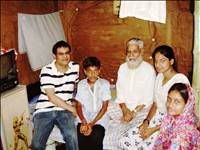
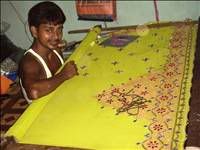
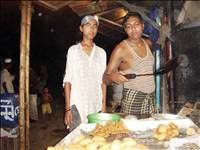

This was an extraordinary afternoon when the receding sun was converting the sky into a field of unimaginable colours that artists can only aspire to create through their limited palettes. Dhaka, the noisy, overcrowded megapolis can be enchanting at times, especially during late springtime when the Krishnochura trees (the Flame of the Forest) bloom all over with their fiery flowers.
I almost cancelled the trip thinking that a walk in the park might be a better alternative to the usual South Asian gluttony. Quite soon, I arrived at the meeting point having rationalised my proclivity for indulgence.
Little did I know that the meeting point was nowhere but at the doorstep of Dhaka’s underbelly, the easy to ignore Bihari camp. Not until I had reached there had I realised how the wounds of 1971 were festering for hundreds and thousands of men, women and children who have waited for all these years to attain identity and citizenship of Pakistan. As if it were a curse, the Pakistani state soon forgot about their existence as its ethnic politics dominated the policy commitments of Bhutto. And for the Bangladeshis these were the “traitors” who continued to wave Pakistani flags when the vast majority of East Pakistanis revolted against the excesses and the might of Pakistan army following the infamous and mischievous army action of 1971.
In a few minutes I had all but forgotten about the famous Mustaqeem kebabs and parathas and forced Ronny to take me inside the camp. Very soon I realised I did not need any Bangla-speaking guide as the ghetto was Urdu speaking, and portraits of Pakistani leaders and flags could still be spotted despite the passage of three and a half decades. Ronny knew the locals and found his younger friends, child workers and idle youth who took charge of our little tour.
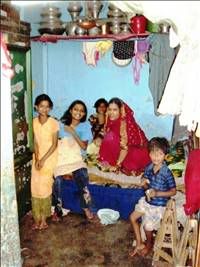 Shamed by guilt and excited by the real experience, I wandered the smelly, open-drained and dark streets of the ghetto. I have frequented other slums but this one was special for it reeked of the contemporary elite politics, bloodshed and cold inhumanity that Pakistanis are shy of confronting. The living conditions would put any half-concerned South Asian to shame. The homes for most of the families comprised tiny little rooms, with all the belongings and large families concentrated in the inner space. No proper toilets and water supply – as if civilization had taken a backseat here.
Shamed by guilt and excited by the real experience, I wandered the smelly, open-drained and dark streets of the ghetto. I have frequented other slums but this one was special for it reeked of the contemporary elite politics, bloodshed and cold inhumanity that Pakistanis are shy of confronting. The living conditions would put any half-concerned South Asian to shame. The homes for most of the families comprised tiny little rooms, with all the belongings and large families concentrated in the inner space. No proper toilets and water supply – as if civilization had taken a backseat here.
The tragedy of these stateless people was immense and of an in-your-face variety. Such moments can only be experienced – readings and theorisations rarely help. Mohammadpur is just one of the 116 camps all over Bangladesh set up immediately after the Liberation War of 1971, euphemistically referred to as the “Fall of Dhaka” in our textbooks. How did all this happen?
Not unlike much of the mess afflicting the region, the Partition of India in 1947 witnessed large-scale communal riots and thousands of Muslims from Bihar, West Bengal and other provinces arrived in what was known then as East Pakistan. The refugee settlements, reminiscent of Karachi, were inward looking monocultural spaces, a little away from the Bengalis. In the complex political economy of a united Pakistan, “Biharis,” by now a composite term for the non-Bengali Pakistanis in East Pakistan, became the object of Bengali ire based on common perceptions that the state gave them a preferential treatment. It is estimated that by 1971, over 1.5 million such non-Bengalis, ‘Biharis,’ were present in East Pakistan.
In 1971, the Biharis were a torn community. The Pakistan army, sensing this divide, apparently recruited some Biharis to fight the rebellious Bengalis. Whether they supported the Pakistan army or not, many Biharis remained neutral in 1971, shy of taking sides with their local brethren.
Thus the schism widened in those tumultuous years leading to the sub-human ghettoisation of the wretched children of a lesser God. After the war in 1971, the International Community for the Red Cross intervened and found out that most Biharis wanted to migrate to the truncated Pakistan. Over half a million registered “Urdu-speaking” Pakistanis found a voice at the high level Simla pact of July 1972 and later an agreement was reached in 1973 between Pakistan, India and Bangladesh on this issue. As per the agreement, the Bengali prisoners were released and sent to Bangladesh. However, not all Urdu-speaking Pakistanis were repatriated to Pakistan. Even today hundreds of thousands live in Bangladesh in camps as non-citizens.
So Mohammadpur turned out to be an encircled little inferno located next to fairly well-to-do neighbourhoods and commercial areas. Human spirit however knows how to counter the forces of nature and history. Inside the camp, little Bihars had been recreated with the memories and longings that the migrants are well known for. The cuisine, the sweets and eateries were all preparing and selling the Bihar delights: Pua, prepared from a mixture of powdered rice, milk, ghee, and honey, Pittha (steamed powdered rice mix), Khaja (a sweet delicacy); and Ladoos, Kala Jamun, and so many others that have escaped my memory.
Handicrafts and automobile repairs were common professions. As I peeped into the dingy rooms – homes and workshops rolled into one – women and men were busy working on brightly coloured saris. Many youth find this their ordained profession. There were also places for recreation: snooker, carom boards and tea stalls. We stopped at a tea stall and sipped the milky tea with lots of sugar served with anarasas (sweet round-shaped snacks). For some reason many people had gathered there and my Pakistani status was now well-known. Details of Pakistan, Karachi and lost relatives were recounted with much passion. The tea stall owner, Ahmad’s brother, had escaped to Pakistan but Ahmad never heard from him for years. Sometimes these situations land you in a zone where words are empty and meaningless; and perhaps listening becomes the best mode of communication.
We got up and reached another side of the slum packed with Urdu-wallahs. There is obviously a hint of racism when the Biharis are mentioned in the mainstream parlance in Bangladesh. The older generation complains more than the younger ones, who by their situation are better integrated and bilingual. At a carom club, the young men tell me they like Pakistan but do not wish to go there. “This is our country and our home, we are Bangladeshis.” Others nodded and chuckled at the remark. Free of the baggage, the younger generations are far more ready to become Bangladeshis.
Probably this is the reason that civic activism has earned voting rights for those born after 1971. The court ruled in 2008 that “the refugees who were minors in 1971 or born after the independence of Bangladesh are citizens of Bangladesh,” after years of legal wrangling and ideological debates in the country. However, those who were adults in 1971 were not covered.
The warmth for a Pakistani was more palpable among the elderly. I was treated with much affection in their houses. Yes, I did visit them as well, trying hard to disguise my shock at what constituted “housing.” But the conversations were fun-filled and hearty. Mirza Saheb from Muzaffarnagar related the stories of how he migrated as a child with his family after communal riots of 1947 nearly destroyed them. Respect for Jinnah and the idea of Pakistan also filtered through the discussions. But then there were witty lines and little anecdotes as well on how some Pakistanis were half or quarter Pakistanis. The full status could only be earned if you are not a Bihari!
Education is a casualty. In part this is a result of marginalisation from the state services and in most cases a simple case of poverty where family-based work for money is more important than the luxuries of schooling. Stories of discrimination were also related as to how difficult it was get a job when you were from a stateless camp.
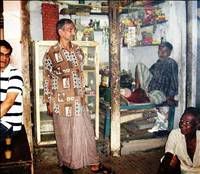 Arif, a rickshaw-puller, narrated the woes of getting registered as a rickshaw-wallah without an identity card. He had bribed his way through and somehow used the black economy to remain employed. His wife, Nazia, a cheerful and attractive woman, insisted that I should have tea. I stayed longer. The family watched a lot of TV, especially the Indian soaps as they were in Hindi/Urdu and thus accessible. In fact, most homes had TV sets fixed on the walls – the fruits of globalisation quite evident and pluck-able.
Arif, a rickshaw-puller, narrated the woes of getting registered as a rickshaw-wallah without an identity card. He had bribed his way through and somehow used the black economy to remain employed. His wife, Nazia, a cheerful and attractive woman, insisted that I should have tea. I stayed longer. The family watched a lot of TV, especially the Indian soaps as they were in Hindi/Urdu and thus accessible. In fact, most homes had TV sets fixed on the walls – the fruits of globalisation quite evident and pluck-able.
I was concerned about Ronny, my companion, who stayed with me throughout. He later confessed that he did not approve of such treatment of the Biharis and in fact many people of his generation were appalled at this. Ronny also made his fondness for the Pakistani cricket team and beautiful girls quite clear, relating how he had a little internet romance with a girl in Karachi. But she was married before he could muster the finances and courage to actually visit Pakistan. Now he was married to another Bangladeshi-Kuwaiti girl whom he also met on the internet after the stymied Pakistan love-chapter.
Ronny’s banter lightened my inner turmoil. Another dose of escapism was offered by the tender and delicious kebabs that we devoured at the end of the camp visit. And I can say for sure that these were the best Bihari kebabs I had tasted. As we finished our late dinner, I noted how a newly constructed glitzy apartment tower overlooked us and the Geneva camp.
There is a Stranded Pakistanis General Repatriation Committee, the courts have issued rulings and the politicians in Pakistan religiously issue statements each year bemoaning the plight of the stranded Pakistanis. True, many Biharis would not return but those who want to might just die dreaming of a homeland that never will be. In South Asia we have made a royal mess of things – first the Partiton, the violence against Bangaldeshis and our refusal to admit that we were wrong; and then such insensitivity to those who are trapped between conflicting histories and ideologies.
Raza Rumi is a writer. He blogs at www.razarumi.com and edits a cyber magazine, Pak Tea House, and the Lahore Nama blog-zine.




















































Informative post but rather unfortunate reading. Last year, or perhaps earlier this year, BD government had given citizenship rights to the Biharis. I do not know what happened after that. But, regardless of faith, they must understand that it was their ghetto mentality and self-alienation that led to the crisis. Having lived in BD for decades, they never bothered to assimilate in the surrounding culture, learn the majority language and contribute to the social fabric. Even if they are transferred to Pakistan, they are likely to do what they did best and that is to beat the drums of grandiose past and look down upon the locals.
There are ample reasons why majority of BD citizen suspect their loyalty.
Their plight needs to be addressed on human basis and not necessarily on religious basis even though they got fooled into this situation by JI… plus they are a living legacy of Yahya Khan, Tikka Khan and our Machiavellian Prince…..
Half the board is filled with people thrashing the Americans when more than 95% of our problems our self created. Ethnic and religious divisions and political corruption are not some Jewish or American consiparacy they are all self made problems. I have always felt that as Pakistani’s we are much better at blaming others for our problems. The plight of the Bihari’s is a sad reflection on our failed state. We as a society have failed the people who need us most. The fact is Pakistan has ceased to exisist outside of Punjab for a while now.
Its my biggest fear that the ‘elite’ which includes everyone reading this blog regardless of material wealth are going to be in the cross hairs of a bloody social uprising. It is only a matter of time before the plush streets of defense housing schemes and the english medium schools become targets for a repressed population.
Mr. Zia Hussain is on to some thing when he says:
“One solution to Phathan, Punjabi, Sindhi problem is to end ‘suba-system’ [ethnicity based provinces]. End governments of Punjab, Sindh ect. and divide [the] country in to smaller [units] government systems.”
However such changes will require dismantling the present federal system and could be done only by constitutional means with 2/3 majority votes. If done it will give ‘Mahajars’ their own “suba” in Karachi that MQM is longing for. Would ethnic Sindhis go for that? In Punjab Saraiki speaking and Potowari speaking populations will like to have their own “subas”. Would central Punjab tolerate that?
Pashtoon nationalists want to consolidate Pashtoon areas into Pukhtoonistan. Baloch nationalist want autonomy for the entire Balochistan. And what about Azad Kashmir and the Northern areas and the Tribal areas? It is a subject worth a thorough study. May be Mr. Rumi or some one else could shed light on that.
@zia hussain,
Why just blame Zardari or even Pak?
We have to look deeper ….to our roots and look at what the truth and reality is telling us?
You tell me which muslim country is doing what it really needs to become a viable self governiing country.
Take Dubai (or any muslim country for that matter)?….certainly they are rich due to oil….but apart from buildings …what do they actually produce?
Where the steel plants, the car production plants, the manufacturing base…the architects, the production managers, in short where is the LOCAL expertise. They don’t even have peoples who can sell or let the apartments that are build….even these sellers are from outside…..WHY?
As for the LOCALS….they have no expertise…therefore they do not earn much…and therefore they cannot afford to buy or rent….THIS is the truth everywhere in our country and countries of the ummah!
It’s all imported …because money is available (as a result of a geological accident…oil being there) this is all thanks to Allah SWT.
However Allah SWT cannot keep us (or them) sustained forever….he has given us opportunity….”build up local expertise and manufacturing base while you can….because you will need it …when the oil runs out….this scenario is only 20 odd years from now….and then no body will want to know us.
At that point it will not only be Pak in meltdown…but whole muslim world could collapse?
I fear much for our future as muslims….and I try to teach my childrens this lesson….they must be practical, honest and not look through rose tinted glasses….right now we are going nowhere.
Shame on you all pakistanis who blame on your afghan brothers, and who want to throw anybody out of this country to please USA.
Its your own foul who wote for PPP and PML-N again and again.
Mr Zardari is the right leader for you because: “choro ka sardar chor”
Every time i have been to pakistan i have seen lot of coruption, starting with “kolis” at the airport and so on…..
They are muslims but not acting like muslims. No one can save you but god and your selfs, dont depend on Americans. They will leave you when they have got what they want, like they always have.
One solution to Phatan,Punjabi, Sindi problem is to end “suba-system”, end government of Punjab, Sind ect. And divide country in to smaller goverment systems as they have in Norway. Exampel if you have on government of Karachi, One for Lahore and so on.We will have many small governments who will be easy to contact.